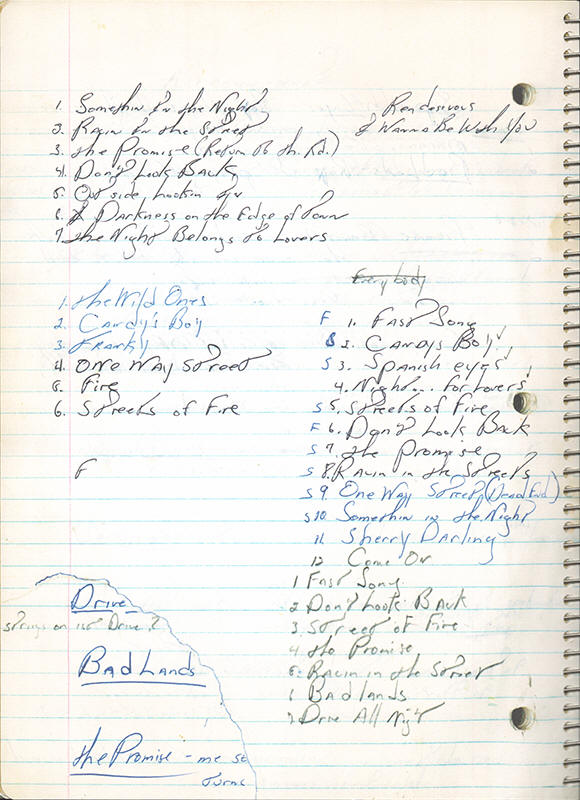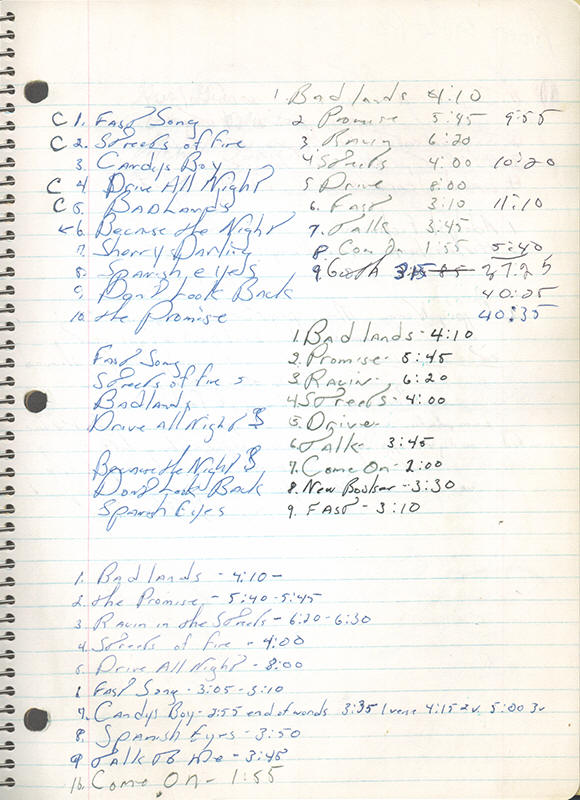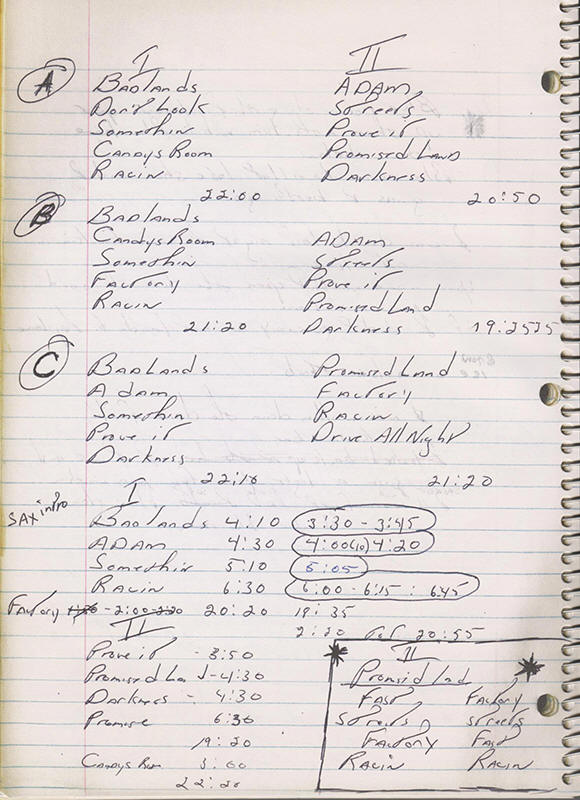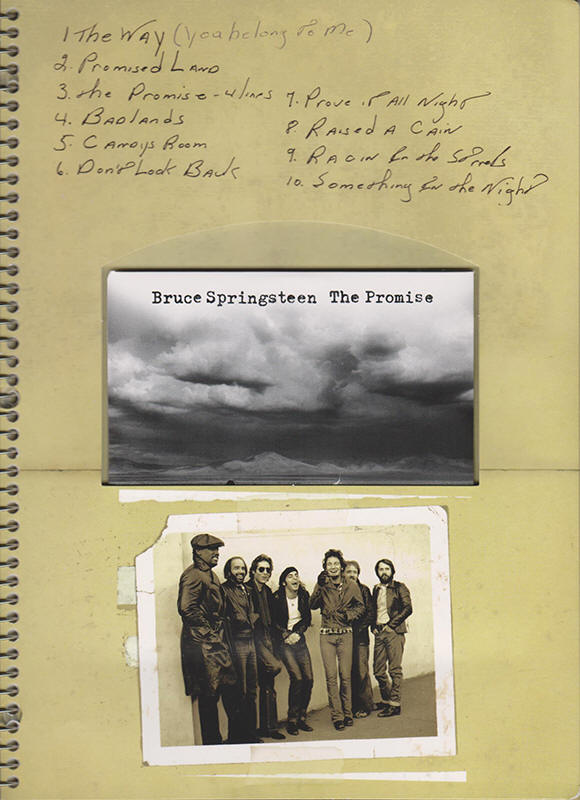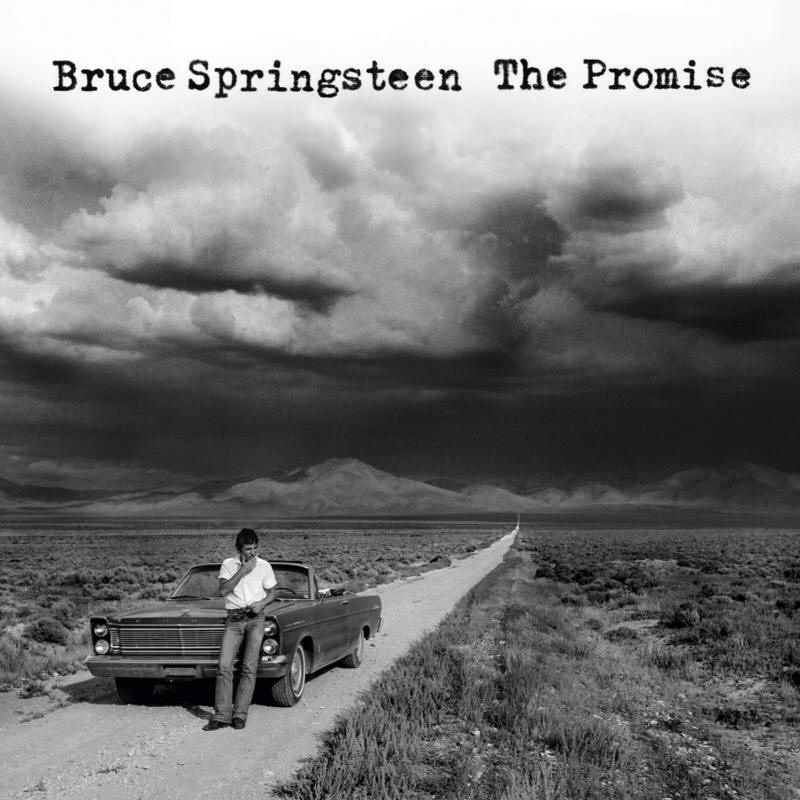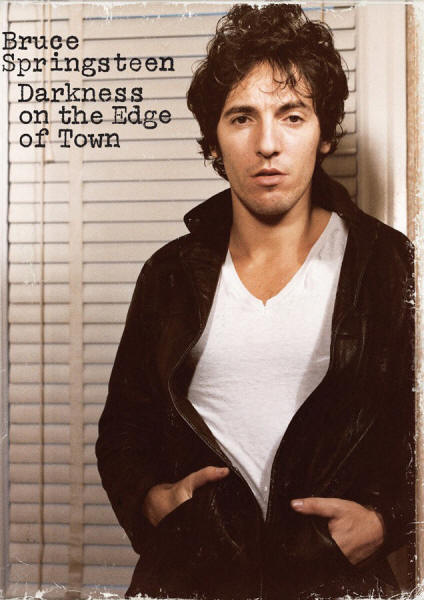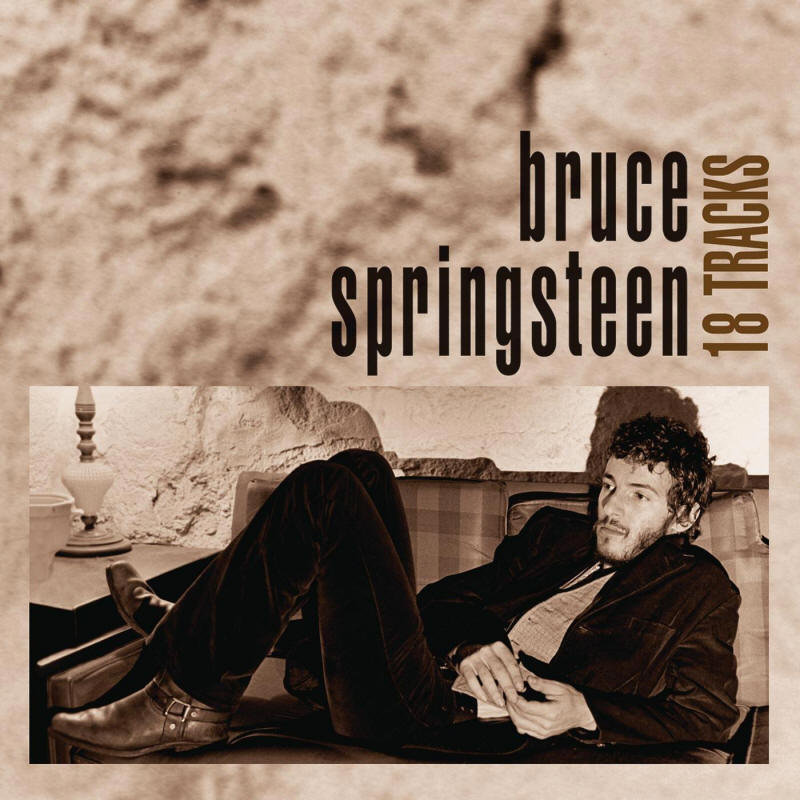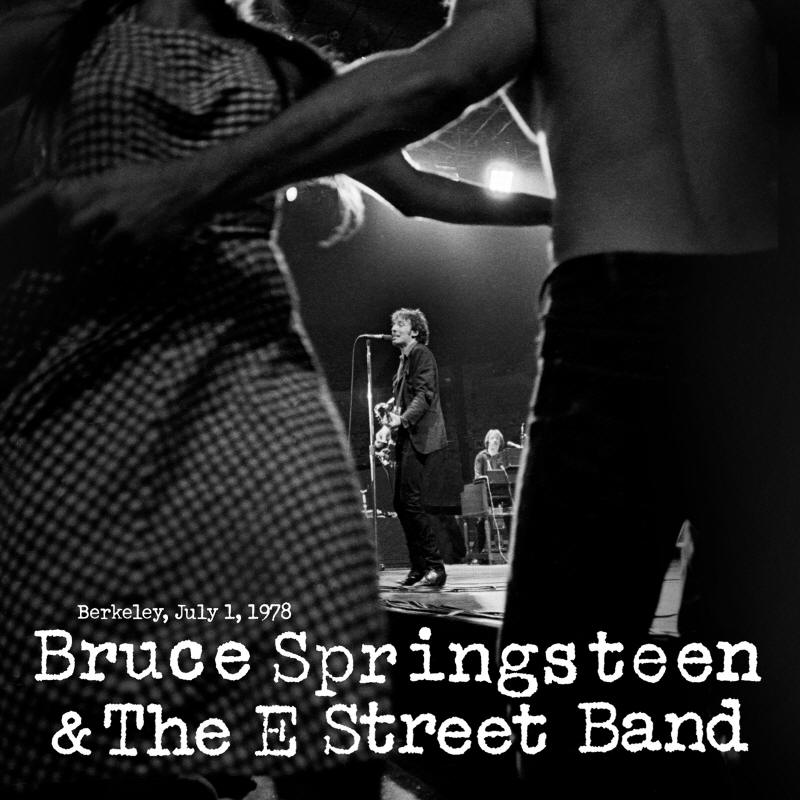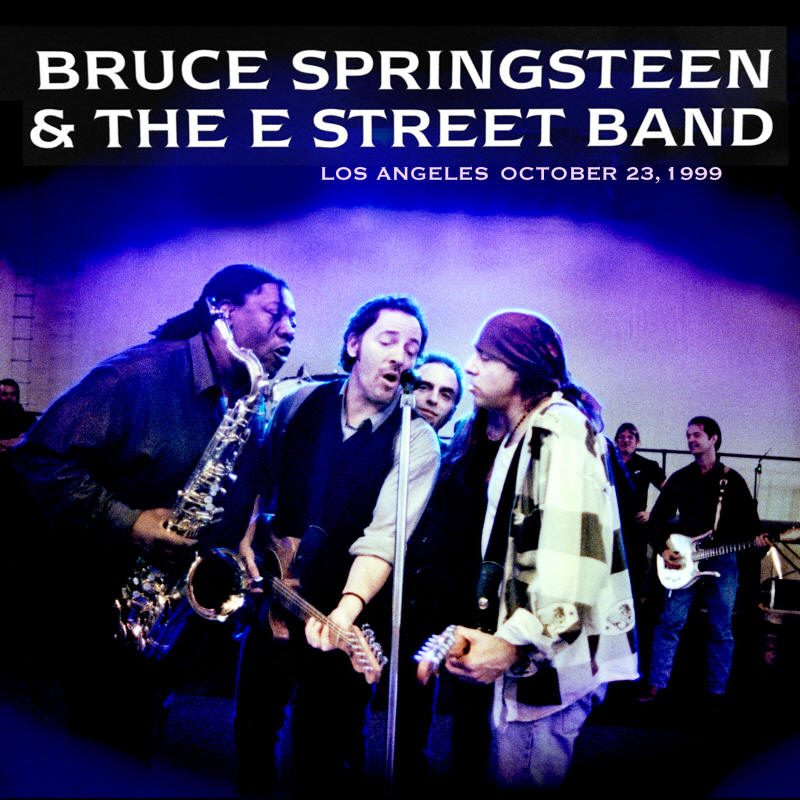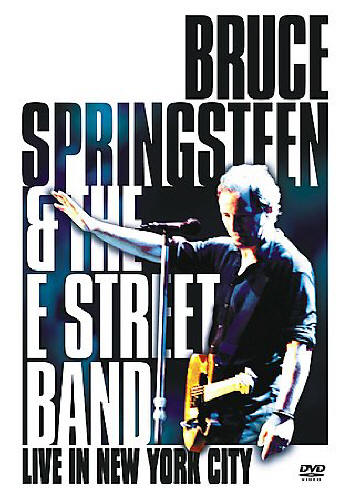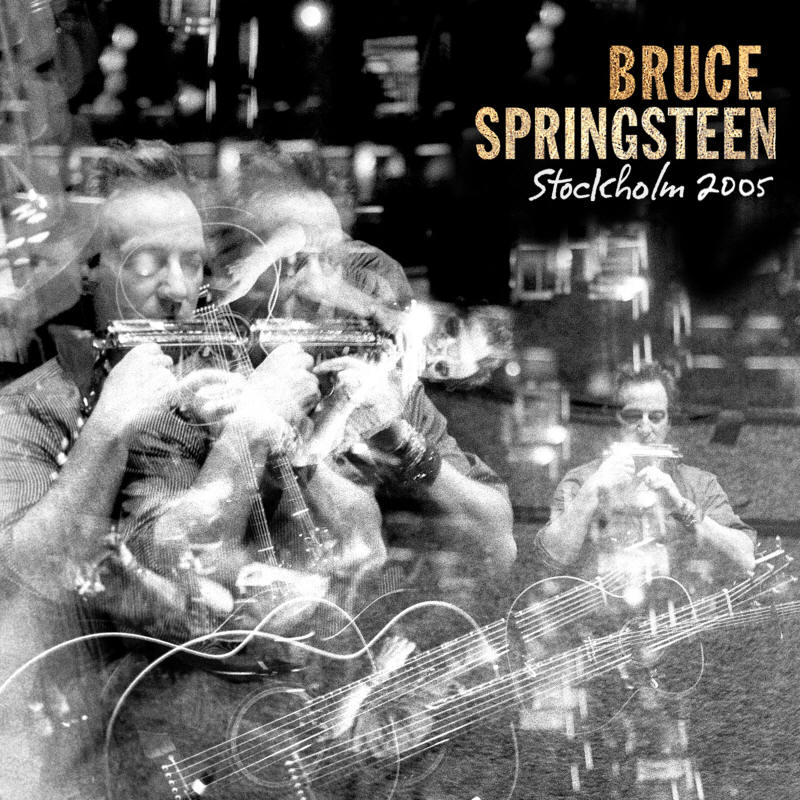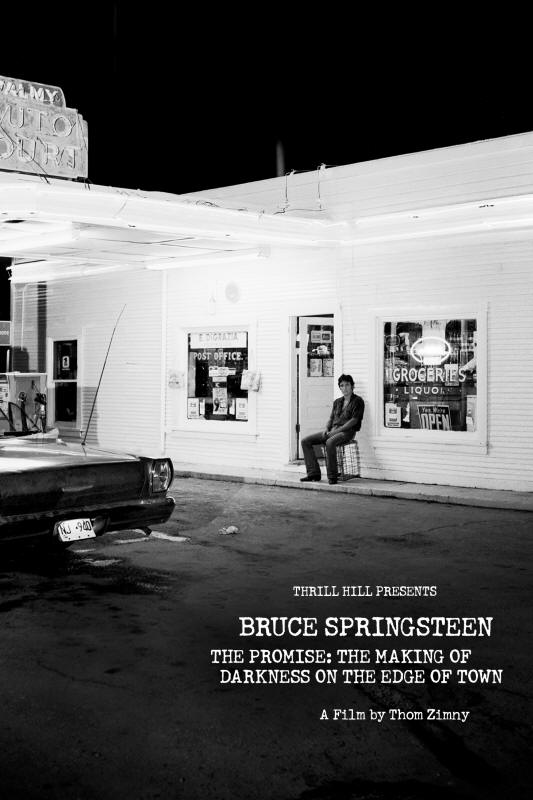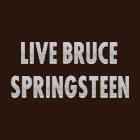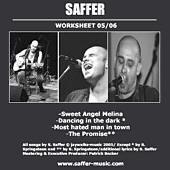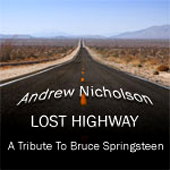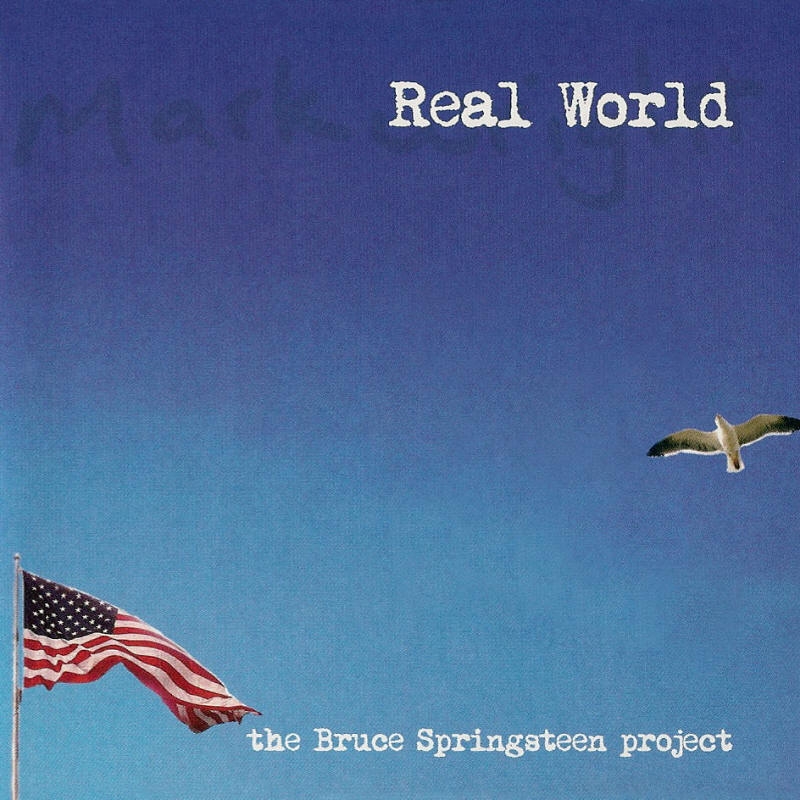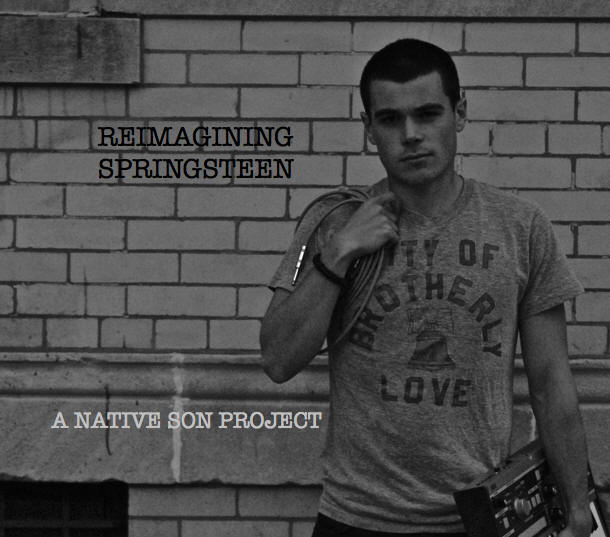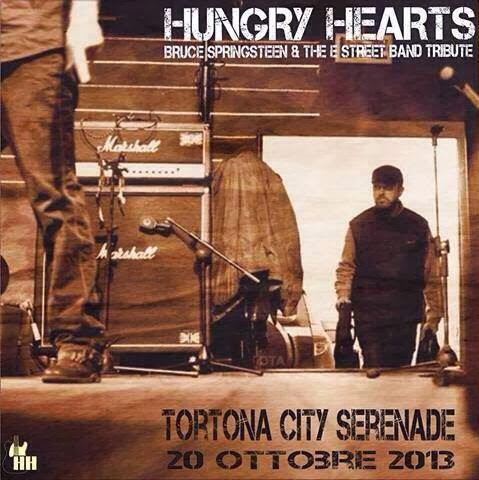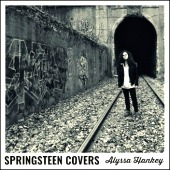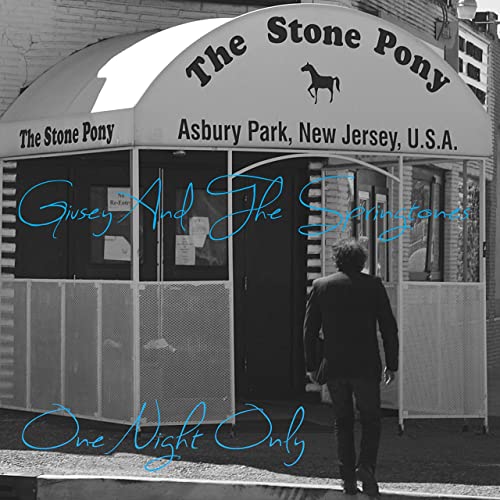THE PROMISE 
Official 1977 studio version
Johnny works in a factory and Billy works downtown
Terry works in a rock and roll band looking for that million-dollar sound
And I got a little job down in Darlington but some nights I don't go
Some nights I go to the drive-in or some nights I stay home
I followed that dream just like those guys do way up on the screen
And I drove a Challenger down Route 9 through the dead ends and all the bad scenes
And when the promise was broken, I cashed in a few of my own dreams
Well now I built that Challenger by myself, but I needed money and so I sold it
I lived a secret I should've kept to myself, but I got drunk one night and I told it
All my life I fought this fight, the fight that no man can ever win
Every day it just gets harder to live this dream I'm believing in
Thunder Road, oh baby you were so right
Thunder Road, there's something dying down on the highway tonight
I won big once and I hit the coast, oh but somehow I paid the big cost
Inside I felt like I was carrying the broken spirits of all the other ones who lost
When the promise is broken you go on living, but it steals something from down in your soul
Like when the truth is spoken and it don't make no difference, something in your heart turns cold
Thunder Road, for the lost lovers and all the fixed games
Thunder Road, for the tires rushing by in the rain
Thunder Road, remember what me and Billy we'd always say
Thunder Road, we were gonna take it all then threw it all away
Info
THE PROMISE is a song written by Bruce Springsteen and released on The Promise collection in 2010. The above lyrics are for Bruce Springsteen's studio version of THE PROMISE as released on The Promise.
A 1999 recording of the song was released on the 18 Tracks collection in 1999. See the Official 1999 studio version for more details.
THE PROMISE was played live between 1976 and 1978 with some lyrics variations, and was also played occasionally on-tour from 1999 onward. See the "Live History" section below for more details.
Background
Despite the marvelous reception received by both Born To Run and the tour which followed, the relationship between Bruce Springsteen and his now former manager and producer Mike Appel was deteriorating. In July 1976 the storm broke; Mike Appel wrote to Springsteen saying that he would not allow Jon Landau (Springsteen's friend and co-producer of Born To Run) to produce the next album, citing a particular paragraph from their original agreement. Bruce replied on 27 Jul 1976 by firing manager Mike Appel and suing him and his management company Laurel Canyon Ltd. in Federal Court in Manhattan, claiming fraud, breach of trust, and undue influence. Appel countersued on 29 July in New York State Supreme Court, asking the court to prohibit Springsteen and Jon Landau from working together in studio. Bruce Springsteen and The E Street Band were slated to enter the studio that year for the recording of a new album, except that on 15 Sep 1976 the judge in the lawsuits case ruled that Springsteen was enjoined from any further recording with Columbia Records until Appel's suit was resolved. This would drag for about a year.
THE PROMISE gained considerable reputation as Springsteen's ultimate tale of betrayal following live performances beginning in 1976 and even more so in 1977 and 1978. Fans and critics alike have speculated over whether it is about the infamous lawsuit that kept him from the recording studio. When he heard the song for the first time in South Bend, IN, (on 09 Oct 1976 at University Of Notre Dame) the Chicago Reader critic John Milward was moved to write: "The song's metaphor is 'The Challenger,' a race car that the singer has built by hand 'to carry the broken dreams of all those who have lost.' But the real twist comes during the song's bridge, when he sings the words 'thunder road' and immediately transforms his car into his rock and roll dreams. In 'The Promise,' Springsteen mythologizes himself and compares his struggle to be true to his art to the desperate struggle of the young racer. He sings in 'Thunder Road' that 'tonight's the night all the promises will be broken,' but the dream etched in 'The Promise' and put into perspective by Springsteen's own experience is clearly a romantic notion that is not easily shattered. Despite a landscape filled with losers — the singer eventually sells his car when he needs money — it's clear that in Springsteen's heart the Challenger's potential will never die."
Dave Marsh writes in his Springsteen biography Born To Run: The Bruce Springsteen Story that "when Milward refers to 'Springsteen's own experience,' he is clearly alluding to the lawsuit, but Milward is canny enough to know that the lawsuit itself is only a symbol of what Bruce had undergone since Born To Run catapulted him to fame. 'The Promise' is rather about the price everyone pays for success — and the dangers of settling for anything less."
The lawsuit began in July 1976 and Springsteen debuted the song only a week or two later at an early August show in Red Bank, NJ (see "Live History" section below). One does wonder if his decision to debut the song in concert might have been influenced by the just-unfolding litigation. Springsteen has publicly denied that THE PROMISE is about the Laurel Canyon debacle. "I don't write songs about lawsuits," Springsteen said, and the fact that people might think that THE PROMISE was concerned only with legalities kept it off his fourth album.
THE PROMISE was originally considered for the Darkness On The Edge Of Town album, as evidenced in several handwritten lists of candidate tracks for Springsteen's fourth studio album. These lists appear in the handwritten lyrics notebook that was reproduced in The Promise: The Darkness On The Edge Of Town Story box set (see scans below). Too many reviewers of the live shows had considered the song as being "about" the lawsuit with Mike Appel. Fearing that this would cause a misinterpretation of the message he meant to convey, Springsteen held it back and replaced it with RACING IN THE STREET. In the 2010 documentary The Promise: The Making Of Darkness On The Edge Of Town, Springsteen said that THE PROMISE is "a song about fighting and not winning, it was just about the disappointments of the time." It could've made it on the record if they had finished recording it because it fit in the temper of the record, but Springsteen felt that he's "too close to it," as he said in the documentary. "I felt I couldn't judge it myself at the time," he added.
Proposed song lists for Springsteen's fourth album
Proposed song lists for Springsteen's fourth album
Proposed song lists for Springsteen's fourth album
Proposed song lists for Springsteen's fourth album
On 15 Nov 2010, the eve of The Promise release, Sirius XM's E Street Radio channel broadcasted a two-hour special titled "E Street Radio on the Edge of Your Town" and hosted by Dave Marsh. The show featured Bruce Springsteen live in the studio with an intimate audience of 20 contest winners. In the first hour, each had the had the chance to ask him a question in-person about the upcoming release, and in the second hour, the phone lines opened to E Street Radio callers. At one point, Marsh was talking about THE PROMISE as being "about possibility", and Springsteen answered quickly and directly: "It's also about, 'Gee, I wish I wasn't sued!'"
It is believed that this whole "debacle" at least influenced the feel and lyrics of the song — the timing and some of the topics discussed in the song make the connection pretty obvious. By 1978, Springsteen was singing the song with a rewritten final verse (see the live 23 May 1978 version for example):
Well now my daddy taught me how to walk quiet and how to make my peace with the past
I learned real good to tighten up inside and I don't say nothing unless I'm asked
Prequel
Bruce Springsteen played two benefit solo acoustic shows for DoubleTake magazine, on 19 and 20 Feb 2003 at Somerville Theatre in Somerville, MA. He closed out each night with a Q&A session, taking questions from the audience. On the first night, a fan asks him "what was 'The Promise' about?" Springsteen answers that "after Born To Run, I wrote that [the Promise] for Darkness I think. And I was reflecting on sort of the flip side of 'Thunder Road' I think. I was reflecting on the responsibilities that I thought came with my fortune at that time and how it sort of fitted into my life and... that's generally what I remember it, it being about in some fashion."
THE PROMISE explicitly mentions the song THUNDER ROAD by name but reveals a far more pessimistic outlook on the narrator's life and future. Introducing the song during the live 23 Oct 1999 version, Springsteen said that "this is a song I wrote as a kind of a follow-up to 'Thunder Road'."
In the handwritten lyrics notebook that was reproduced in The Promise: The Darkness On The Edge Of Town Story box set, Springsteen listed THE PROMISE as "The Promise (Return to Th. Rd.)" in one place.
Writing
In 1976 and 1977, as the Born To Run Tour dragged on with Springsteen's continuing frustration with his legal situation, the shows became his only outlet. Horn sections were added, songs further arranged, more oldies pulled out, performances sometimes reached the three- or four-hour mark. New material such as the bitter THE PROMISE would appear out of nowhere, then disappear again.
THE PROMISE debuted live on 03 Aug 1976 at the Monmouth Arts Center in Red Bank, NJ, during what was later known as the "Lawsuit Tour". This live debut featured lyrics different from later versions (see the live 03 Aug 1976 version). The song then disappeared from subsequent shows, returning in late September with rewritten lyrics (see the live 29 Sep 1976 version). The significant development of the song between these two live versions indicates that the song was a work-in-progress when it debuted on 03 Aug 1976, which leads to the conclusion that THE PROMISE was most probably written shortly before 03 Aug 1976.
However, during the first few months of the Darkness On The Edge Of Town Tour, Springsteen was introducing THE PROMISE by saying that it was written "just after [he] wrote 'Born To Run'." During one particular show (29 May 1978 in Boston), he said, "This is the first song I wrote after uh... two years ago... right after we recorded 'Born To Run'." It is unclear if he is referring to the song "Born To Run" (mid-1974) or the album "Born To Run" (mid-1975). That it might have been written in 1974 made some wonder if THE PROMISE was recorded as an outtake during the Born To Run sessions. That led Backstreets magazine editor Charles R. Cross to ask Mike Appel about this very matter during a 1990 interview. Appel seemed adamant that it was not a song that Springsteen had introduced to the Born To Run recording sessions, let alone recorded. This tends to support the idea that THE PROMISE was something Springsteen wrote after mid-1975.
Studio Recording
Bruce Springsteen reached a final settlement in his yearlong litigation with Mike Appel on 28 May 1977. Effectively this meant that for the first time in a year Springsteen was able to go into a studio and record. The Darkness On The Edge Of Town recording sessions kicked off in early June 1977 at Atlantic Studios in New York City, NY, and later shifted to The Record Plant in New York City, NY. Springsteen had a considerable amount of new material, but the songs were in various stages of writing completion. Consequently many of the songs were shaped over the course of numerous sessions spanning several months.
According to Dave Marsh, "the first evening [of the album's recording sessions] was spent spent laying down demos of about twenty songs Bruce had written and more or less completed during the lawsuit. They included [...] 'The Promise' [...] from the live shows of the previous year." In The Promise: The Making Of 'Darkness On The Edge Of Town' documentary, recording engineer Thom Panunzio commented that "'The Promise' was an amazing song, and we probably spent three months on [recording] that song".
According to Sony's logs of Bruce Springsteen's studio sessions, THE PROMISE was cut on 30 Jun 1977, 01, 07-08, and 13 Jul 1977, and 24 and 30 Aug 1977 at Atlantic Studios in New York City, NY, and on 28 Sep 1977 and 12 Jan 1978 at The Record Plant in New York City, NY. The song was also recorded on 09 and 12 Feb 1999 at Thrill Hill Recording (Springsteen's home studio) in Colts Neck, NJ. Five studio takes of the song are in circulation.
Unofficial studio version 1 is a little less developed than the other takes and was recorded, according to Brucebase, in June or July 1977 at Atlantic Studios in New York City, NY. Comparing with Sony's logs, this take must have been cut on 30 Jun 1977, 01, 07-08, or 13 Jul 1977 at Atlantic Studios.
Unofficial studio version 2 was recorded, according to The Lost Masters Vol. 2 bootleg liner notes, in August 1977 at Atlantic Studios in New York City, NY. Comparing with Sony's logs, this take must have been cut on 24 and 30 Aug 1977 at Atlantic Studios.
Unofficial studio version 3 was recorded, according to Brucebase, in September or October 1977 at The Record Plant in New York City, NY. Comparing with Sony's logs, this take must have been cut on 28 Sep 1977 at The Record Plant.
Official 1978 studio version was recorded, according to The Promise: The Darkness On The Edge Of Town Story box set liner notes, in 1978 in New York City. This take was cut in early 1978 (most probably early January) at The Record Plant in New York City, NY.
Official 1999 studio version was recorded, according to the 18 Tracks compilation album liner notes, on 12 Feb 1999 at Thrill Hill Recording (Springsteen's home studio) in Colts Neck, NJ.
Official 1977 studio version was recorded in 1977. When carefully listening to this take, one can notice that up to the middle of the third verse it's none other than unofficial studio version 3. The first two verses and half of the third verse are an exact match in these two versions, note by note, word by word. Unofficial studio version 3 is slower due to the speed of the source tape. Note that Springsteen considered that he didn't have a "fully" complete studio take of THE PROMISE, so he re-recorded the song in 1999 specifically for its inclusion on 18 Tracks (see Official 1999 studio version for more details). Still, he later released a 1977 studio version on The Promise in 2010 — that 1997 studio version had to be patched because it was not complete. So, in conclusion, an edited version of unofficial studio version 3 was used for release on The Promise — somewhere in the third verse the song is patched with another take that's not among the circulating ones. The patch apparently starts just after "Like when the truth is spoken"; the sound (most notably the vocals) seems to changes at this spot on the official version.
In a 1998 interview with Charlie Rose, when asked the question of why THE PROMISE was not included in the Tracks boxset, Bruce said "Uh, basically I went back and I listened to it, and uh, we never really got a good recording of it in my opinion. You know it's been a favorite song of a lotta, a lotta people mention that one to me. It sorta was the sequel to THUNDER ROAD in some fashion it referred back to those characters. But I went back and we sorta had a really plotting, heavy handed version of it and I couldn't quite live with it so maybe another time."
The Promise
The Promise is a Bruce Springsteen album that was released on 16 Nov 2010 as part of The Promise: The Darkness On The Edge Of Town Story box set, and separately as a 2-CD set. The album was also issued on a limited edition 3-LP set pressed on 180-gram vinyl.
Bruce Springsteen -- The Promise
The Promise is a collection of 22 previously-unreleased songs from the Darkness On The Edge Of Town recording sessions. Depending on their level of completion back in 1977-1978, some were only remastered, some were overdubbed with 2010 vocals or music, and some were completely re-recorded in 2010. The album was mixed by Bob Clearmountain.
- RACING IN THE STREET is an alternate take to the version found on the Darkness On The Edge Of Town album.
- THE PROMISE is a different version from the one found on 18 Tracks.
- CANDY'S BOY and COME ON (LET'S GO TONIGHT) are early versions of CANDY'S ROOM and FACTORY.
- BECAUSE THE NIGHT, FIRE, and TALK TO ME are songs that Springsteen donated to other artists.
- BECAUSE THE NIGHT, RENDEZVOUS, and FIRE were previously released by Springsteen in live versions.
- THE WAY is a hidden/bonus track and has been circulating on bootlegs in a slightly different mix.
- GOTTA GET THAT FEELING, SOMEDAY (WE'LL BE TOGETHER), WRONG SIDE OF THE STREET, AIN'T GOOD ENOUGH FOR YOU, and CITY OF NIGHT have been circulating on bootlegs in different versions and under different titles.
- OUTSIDE LOOKING IN, ONE WAY STREET, and SPANISH EYES have been circulating on bootlegs in different versions.
- THE BROKENHEARTED is known from the 1978 tour rehearsals.
- SAVE MY LOVE, IT'S A SHAME, THE LITTLE THINGS (MY BABY DOES), and BREAKAWAY are songs that have never circulated or been documented.
Other Official Releases
Other versions of THE PROMISE were also officially released.
Part of
unofficial studio version 2 of THE PROMISE was released on
The Promise: The Darkness On The Edge Of Town Story box set in 2010.
The live 07 Feb 1977 version of THE PROMISE was released on the Palace Theatre, Albany 1977 official live download in 2017.
The live 08 Feb 1977 version of THE PROMISE was released on the Auditorium Theatre, Rochester, NY 1977 official live download in 2017.
The
live 23 Oct 1999 version of THE PROMISE was released on the
Los Angeles October 23, 1999 official live download in 2019.
The live 25 Jun 2005 version of THE PROMISE was released on the Stockholm 2005 official live download in 2020.
The
live 07 Dec 2010 version of THE PROMISE was released on
The Promise: The Making Of Darkness On The Edge Of Town home video in 2011.
Live History: on-tour
THE PROMISE is known to have been performed at least 22 times during the Lawsuit Tour: 16 times during the 1st leg (29 known dates, between August and November 1976) and 6 times during the 2nd leg (33 known dates, between February and March 1977). Some of that period's setlists are incomplete or unknown, and therefore, the song may have been played on some more dates during the Lawsuit Tour. The live 07 Feb 1977 version of THE PROMISE was released on the Palace Theatre, Albany 1977 official live download in 2017. The live 08 Feb 1977 version of THE PROMISE was released on the Auditorium Theatre, Rochester, NY 1977 official live download in 2017.
In preparation for the Darkness On The Edge Of Town Tour, THE PROMISE is known to have been practiced on 19 May 1978 at Paramount Theatre in Asbury Park, NJ, during the only known/confirmed private rehearsal prior to the tour's start. The song was played in the full E Street Band arrangement, only played that way on the opening night of the Darkness On The Edge Of Town Tour, and not used again until 2010. In 1978, Springsteen was singing the song with a rewritten final verse. See the live 19 May 1978 version.
THE PROMISE is known to have been performed at least 23 times during the Darkness On The Edge Of Town Tour (111 dates, May 1978 to January 1979), all of them in the tour's first three months. A few setlists from that period are incomplete or unknown, and therefore, the song may have been played on some more dates during the Darkness On The Edge Of Town Tour. On the tour's opening night the song was played in the full E Street Band arrangement that would not be used again until 2010 (see the live 23 May 1978 version), while on the remaining dates it was played in a solo piano arrangement (see the live 16 Jun 1978 version for an example). The live 01 Jul 1978 version of THE PROMISE was released on the Berkeley, July 1, 1978 official live download in 2021.
In preparation for The Reunion Tour, THE PROMISE was performed during one of the tour's two public warm-up rehearsal shows that took place in March 1999 in Asbury Park.
THE PROMISE was performed 3 times during The Reunion Tour. The song was played solo on grand piano. The live 23 Oct 1999 version of THE PROMISE was released on the Los Angeles October 23, 1999 official live download in 2019. The live 01 Jul 2000 version of THE PROMISE was released on the Live In New York City home video in 2001.
THE PROMISE was performed twice during The Rising Tour. The song was played solo on grand piano.
THE PROMISE was performed 7 times during the Devils & Dust Solo Acoustic Tour (72 dates, April to November 2005). The song was played solo on grand piano. The live 25 Jun 2005 version of THE PROMISE was released on the Stockholm 2005 official live download in 2020.
In preparation for the Wrecking Ball Tour, THE PROMISE is known to have been practiced during the private rehearsal that took place on 12 May 2012 in Seville, Spain prior to the tour's European leg.
THE PROMISE was performed 7 times during the Wrecking Ball Tour (133 dates, March 2012 to September 2013). The song was played once in a full-band arrangement and 6 times in a solo piano arrangement.
THE PROMISE was performed twice during the High Hopes Tour (34 dates, January to May 2014). The song was played in a solo piano arrangement. Audio recordings for most High Hopes Tour shows are officially available for purchase. See the live 08 Feb 2014 version and the live 22 Apr 2014 version for more details.
Live History: off-tour
THE PROMISE was performed off-tour on 07 Dec 2010 at Carousel House in Asbury Park, NJ, during the taping of the "Songs From The Promise" webcast. The song was played twice, in a full-band arrangement featuring David Lindley on violin, and is similar to the studio version released on The Promise. This live 07 Dec 2010 version of THE PROMISE was released on The Promise: The Making Of Darkness On The Edge Of Town home video in 2011.
Covers
At least 9 artists have recorded and released Bruce Springsteen's THE PROMISE.
Saffer -- Worksheet 05/06
CD EP - unknown label (unknown catalog number) - Germany, 2005
4-track EP, includes two Bruce Springsteen covers: DANCING IN THE DARK and THE PROMISE.
Andrew Nicholson -- Lost Highway: A Tribute To Bruce Springsteen
CD - no label (no catalog number) - UK, 2008
This is a Bruce Springsteen tribute album.
Mark Wright -- Real World: The Bruce Springsteen Project
CD - Revolver (REV XD 271) - UK, 2008
This is a Bruce Springsteen tribute album.
Native Son -- Reimagining Springsteen
Digital EP - no label (no catalog number) - USA, 2012
This is a download-only digital Bruce Springsteen tribute EP.
Martyn Joseph -- Tires Rushing By In The Rain
CD - Pipe Records (PRCD023) - UK, 2013
This is a Bruce Springsteen tribute album.
Hungry Hearts -- Tortona City Serenade
Digital album - no label (no catalog number) - Italy, 2014
This is a download-only digital live Bruce Springsteen tribute album.
Alyssa Hankey -- Springsteen Covers
CD EP - no label (no catalog number) - USA, 2016
This is a Bruce Springsteen tribute EP.
Graziano Romani -- Soul Crusader Again: The Songs Of Bruce Springsteen
CD - Route 66 Music (RT612017004) - Italy, 2017
This is a Bruce Springsteen tribute album. See
Graziano Romani's cover version.
Giusey And The Springtones -- One Night Only
Digital album - no label (no catalog number) - Germany, 2020
This is a download-only digital live Bruce Springsteen tribute album, recorded at The Stone Pony in Asbury Park, NJ.
Credits / References
Thanks Neil (Five Stubbs) for the lyrics help.
Some of the above info about the studio sessions and the live performances is taken from Brucebase. Info about some of the above THE PROMISE cover releases is taken from the Nebraska website.
Request
If you have any corrections or additional information to this page, please contact me via the below form or by email: .
Available Versions
List of available versions of THE PROMISE on this website:
THE PROMISE [Official 1977 studio version]
THE PROMISE [Official 1978 studio version]
THE PROMISE [Official 1999 studio version]
THE PROMISE [Unofficial studio version 1]
THE PROMISE [Unofficial studio version 2]
THE PROMISE [Unofficial studio version 3]
THE PROMISE [Live 03 Aug 1976 version]
THE PROMISE [Live 29 Sep 1976 version]
THE PROMISE [Live 30 Oct 1976 version]
THE PROMISE [Live 19 May 1978 version]
THE PROMISE [Live 23 May 1978 version]
THE PROMISE [Live 16 Jun 1978 version]
THE PROMISE [Live 01 Jul 1978 version]
THE PROMISE [Live 23 Oct 1999 version]
THE PROMISE [Live 01 Jul 2000 version]
THE PROMISE [Live 20 Jul 2005 version]
THE PROMISE [Live 07 Dec 2010 version]
THE PROMISE [Live 08 Feb 2014 version]
THE PROMISE [Live 22 Apr 2014 version]
THE PROMISE [Graziano Romani's cover version]
Page last updated: 28 Aug 2017

